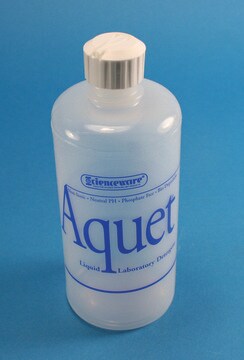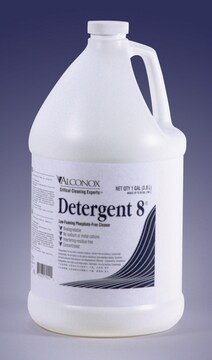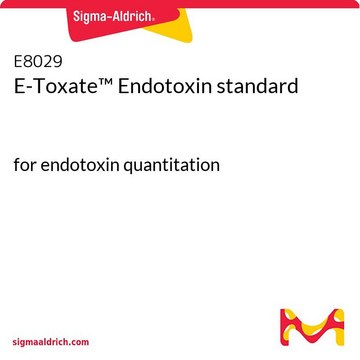E9029
E-Toxa-Clean™ Concentrate
alkaline detergent
Synonym(e):
Endotoxin removal agent
Anmeldenzur Ansicht organisationsspezifischer und vertraglich vereinbarter Preise
Alle Fotos(1)
About This Item
UNSPSC-Code:
12352202
NACRES:
NA.26
Empfohlene Produkte
Qualitätsniveau
Verwandte Kategorien
Anwendung
E-Toxa-Clean™ Concentrate has been used to destroy all the endotoxins in the glasswares. It is also been used to destroy the contamination of low density lipoprotein (LDL)(+) and LDL(−) with lipopolysaccharide (LPS).
Use at 1% in hot tap water.
Biochem./physiol. Wirkung
Alkaline detergent for pre-cleaning glassware prior to inactivation of endotoxin by steam sterilization or baking.
Rechtliche Hinweise
E-Toxa-Clean is a trademark of Merck KGaA, Darmstadt, Germany
Ähnliches Produkt
Produkt-Nr.
Beschreibung
Preisangaben
Signalwort
Danger
H-Sätze
Gefahreneinstufungen
Acute Tox. 4 Oral - Eye Dam. 1 - Skin Irrit. 2
Lagerklassenschlüssel
11 - Combustible Solids
WGK
WGK 2
Flammpunkt (°F)
Not applicable
Flammpunkt (°C)
Not applicable
Persönliche Schutzausrüstung
dust mask type N95 (US), Eyeshields, Faceshields, Gloves
Analysenzertifikate (COA)
Suchen Sie nach Analysenzertifikate (COA), indem Sie die Lot-/Chargennummer des Produkts eingeben. Lot- und Chargennummern sind auf dem Produktetikett hinter den Wörtern ‘Lot’ oder ‘Batch’ (Lot oder Charge) zu finden.
Besitzen Sie dieses Produkt bereits?
In der Dokumentenbibliothek finden Sie die Dokumentation zu den Produkten, die Sie kürzlich erworben haben.
A rapid protocol for construction and production of high-capacity adenoviral vectors.
Jager L, et al.
Nature Protocols, 4(4), 547-547 (2009)
Electronegative LDL induces priming and inflammasome activation leading to IL-1 beta release in human monocytes and macrophages.
Estruch M, et al.
Biochimica et Biophysica Acta - Molecular and Cell Biology of Lipids, 1851(11), 1442-1449 (2015)
Lorenz Jager et al.
Nature protocols, 4(4), 547-564 (2009-04-18)
High-capacity adenoviral vectors (HC-AdVs) lacking all viral coding sequences were shown to result in long-term transgene expression and phenotypic correction in small and large animal models. It has been established that HC-AdVs show significantly reduced toxicity profiles compared with early-generation
Unser Team von Wissenschaftlern verfügt über Erfahrung in allen Forschungsbereichen einschließlich Life Science, Materialwissenschaften, chemischer Synthese, Chromatographie, Analytik und vielen mehr..
Setzen Sie sich mit dem technischen Dienst in Verbindung.










